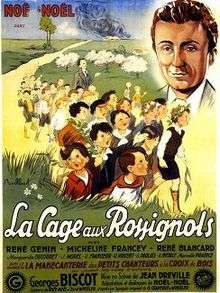A Cage of Nightingales
A Cage of Nightingales (French: La Cage aux rossignols) is a 1945 French film directed by Jean Dréville. It was nominated for the Academy Award for Best Story, and served as an inspiration for the film The Chorus (2004).
| La Cage aux rossignols | |
|---|---|
 | |
| Directed by | Jean Dréville |
| Written by | Georges Chaperot (story) René Wheeler (story & screenplay) Noël-Noël (adaptation, dialogue & screenplay) |
| Starring | Noël-Noël Micheline Francey Georges Biscot |
| Music by | René Cloërec |
| Cinematography | Paul Cotteret Marcel Weiss |
| Edited by | Jacques Grassi |
| Distributed by | Compagnie Parisienne de Location de Films |
Release date | 6 September 1945 |
Running time | 89 min |
| Country | France |
| Language | French |
| Box office | 5,085,489 admissions (France)[1] |
Synopsis
Clement Mathieu seeks to publish his novel without success. With the help of a friend who is a journalist, his story about the 'Cage of Nightingales' is slipped surreptitiously into a newspaper...
In France, in the 1930s, a supervisor at a rehabilitation house awakens difficult teens' inner musical tendencies by forming a choir, despite the director's skepticism. Later, this experience is reported in a novel in a major newspaper.
The history of the 'Cage of Nightingales' is directly inspired by that of an actual educational centre, called Ker Goat, where Jacques Dietz, Roger Riffier and their teams worked to help children in difficulty through choral singing and innovative teaching methods.
Cast
- Noël-Noël as Clément Mathieu
- Micheline Francey as Micheline
- Georges Biscot as Raymond
- René Génin as Le père Maxence
- René Blancard as Monsieur Rachin
- Marguerite Ducouret as La mère de Micheline
- Marcelle Praince as La présidente
- Marthe Mellot as Marie
- Georges Paulais as Monsieur Langlois
- André Nicolle as Monsieur de la Frade
- Richard Francoeur as Monsieur de Mézères
- Jean Morel as Le directeur
- Roger Vincent as L'académicien
- Michel François as Lequerec
- Roger Krebs]l as Laugier
- Choir - Les Petits Chanteurs à la Croix de Bois
Reception
The film was the second most popular movie at the French box office in 1945.[1] A highly regarded adaptation of the film, under the title Les Choristes (English title: The Chorus) came out in 2004, and starred the French actor Gérard Jugnot. It was directed by Christophe Barratier.
References
- French box office of 1945 at Box Office Story